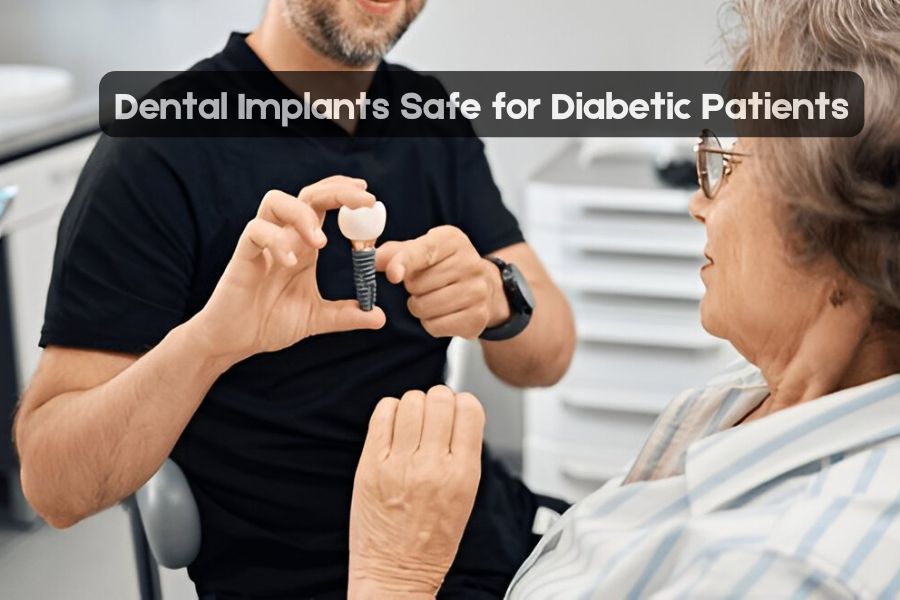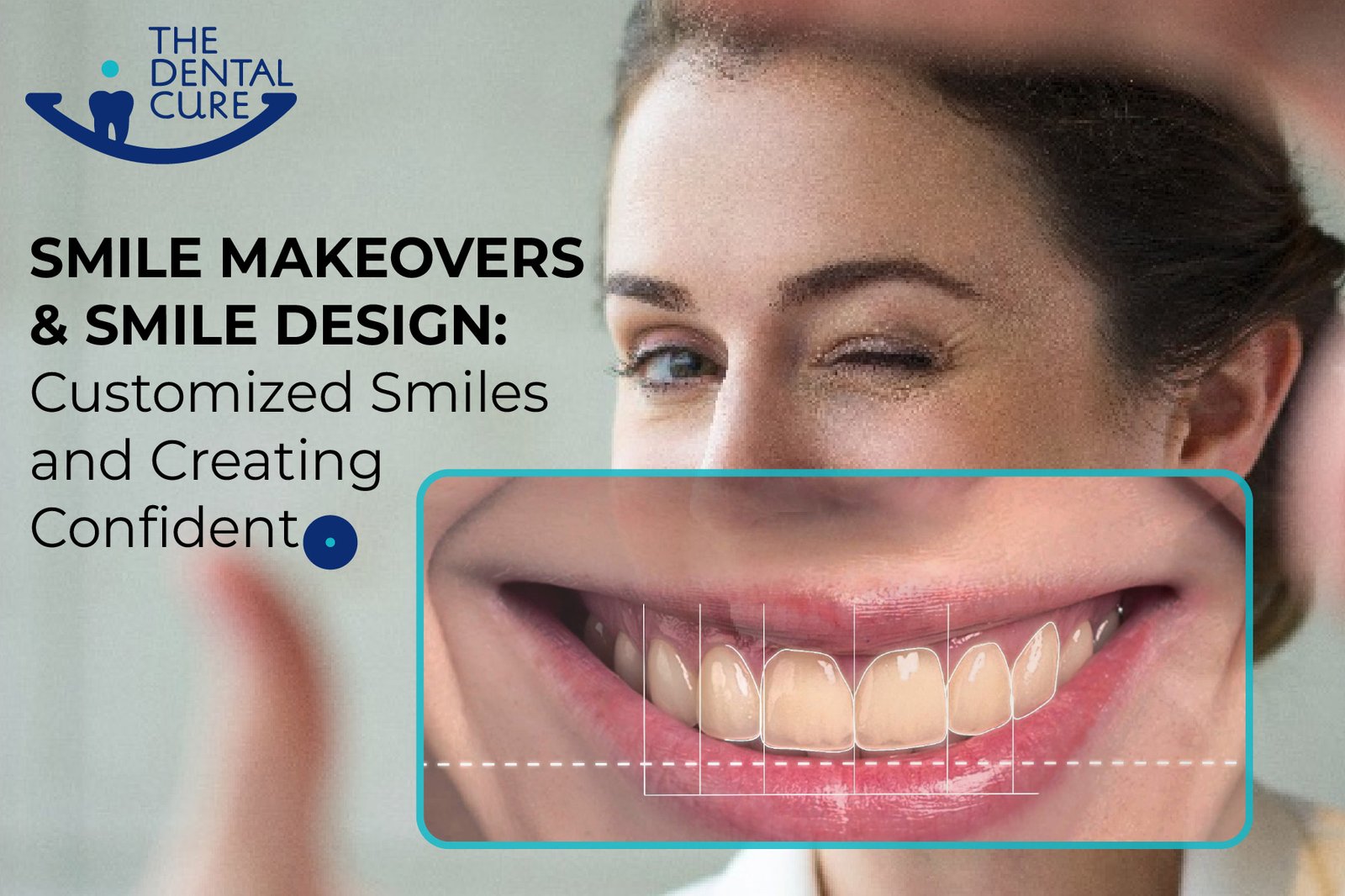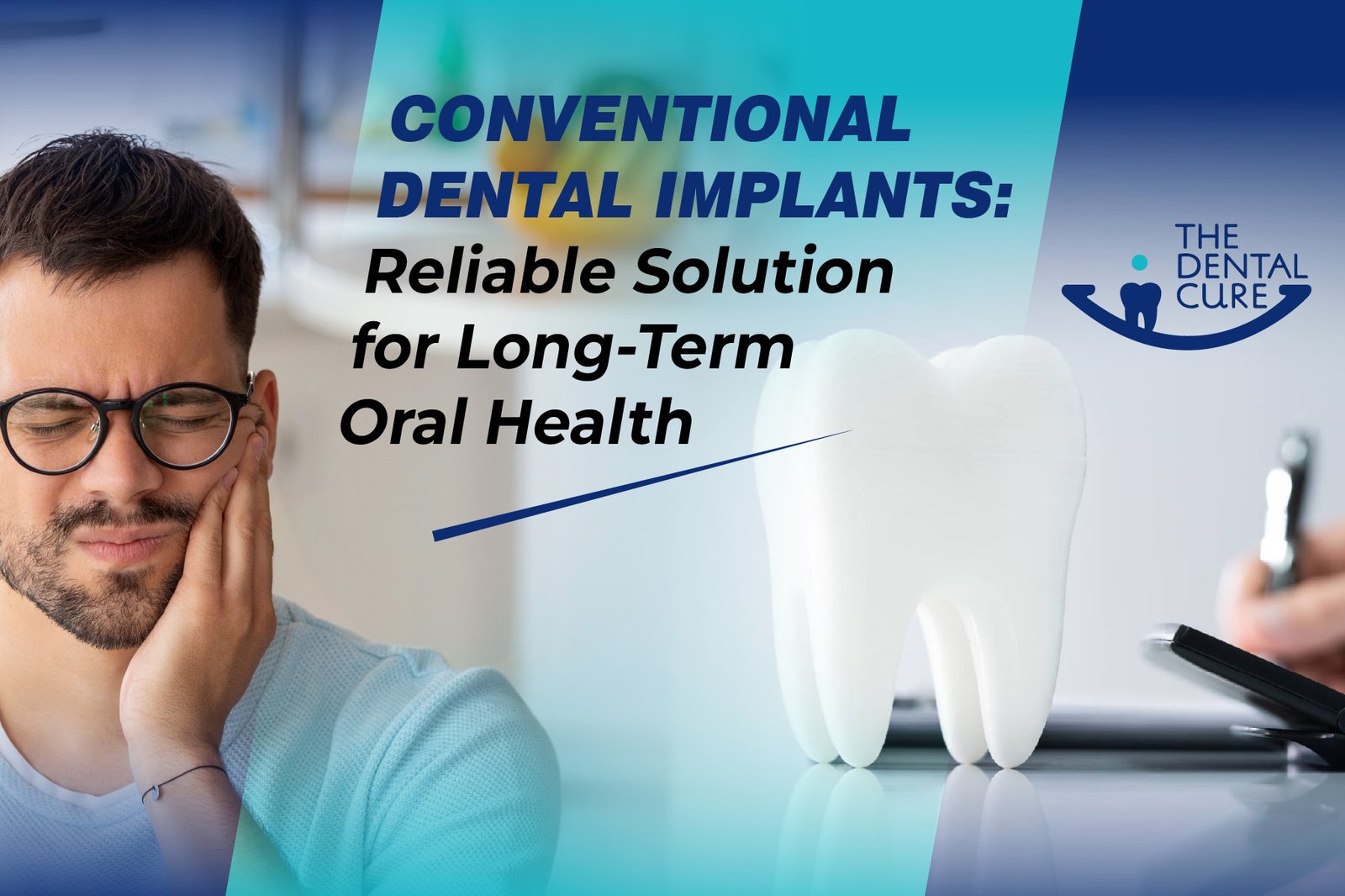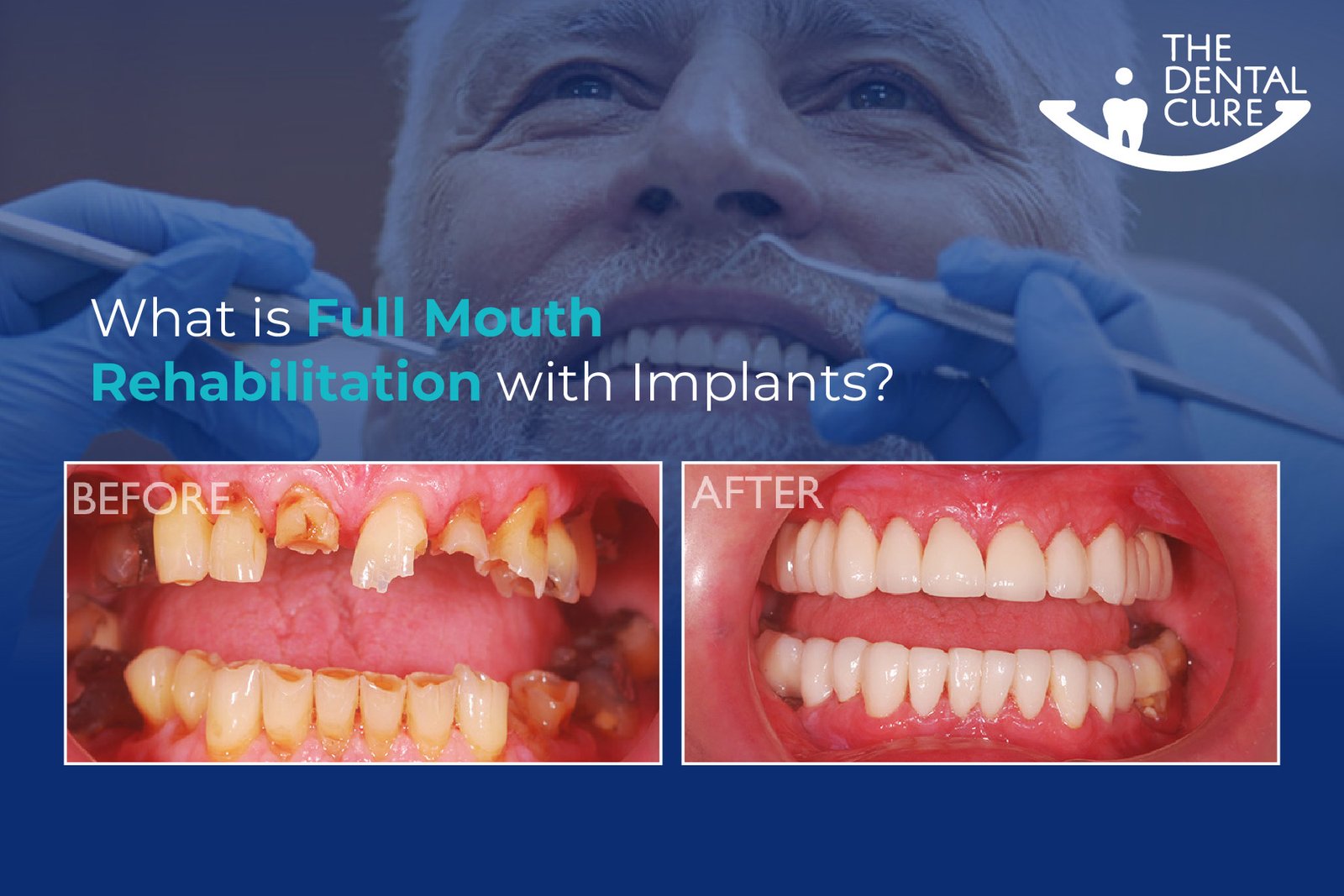For many people, dental implants are a life-changing solution to replace missing teeth. But if you’re living with diabetes, you might wonder, “Can I get dental implants safely?” or “Will diabetes affect my implant success?”
At The Dental Cure, Gurgaon, we meet many patients who share these concerns. The good news is: yes, dental implants are possible for diabetic patients, but there are some important things to consider before moving forward.
Let’s break this down in simple terms, so you know what to expect and how to prepare for a smooth dental implant journey.

How Does Diabetes Affect Dental Implant Treatment?
First, let’s understand what makes diabetes a factor when it comes to implants.
When blood sugar levels are high, your body’s ability to heal slows down. Healing is a big part of dental implant success because the implant needs to “bond” with the jawbone, a process called osseointegration.
Here are three ways diabetes can impact dental implants:
- Slower Healing
After an implant is placed, your body needs to heal and form a strong bond between the implant and bone. If diabetes isn’t well-controlled, healing may take longer or be incomplete. - Higher Risk of Infection
Diabetes can lower the body’s ability to fight infections. Since placing implants is a surgical procedure, there’s a small risk of infection that can be higher for diabetics if sugar levels are not stable. - Bone Health Issues
Healthy bones are crucial for supporting implants. Poorly managed diabetes can lead to weaker bones, making it harder for the implant to stay in place long-term.
So, Are Dental Implants Safe for You If You Have Diabetes?
Yes — if your diabetes is under control.
Studies and expert opinions agree that people with controlled diabetes can successfully get dental implants, with success rates very close to those without diabetes.
But if your sugar levels are high and fluctuate often, the risk of complications increases.
👉 Important takeaway: Managing your diabetes is the key to getting safe and successful dental implants.
What Should You Do Before Considering Dental Implants?
If you are diabetic and thinking about getting implants, here are 5 important steps you should follow:
1. Check and Control Your Blood Sugar Levels
Before starting treatment, your dentist and doctor may want to check your HbA1c levels (a measure of your average blood sugar over 3 months). Ideally, this should be below 7% for better healing and implant success.
2. Inform Your Dentist About Your Medical History
At The Dental Cure, we take time to understand your complete medical background, including how long you’ve had diabetes, your medications and how well your sugar is controlled.
3. Plan for a Customized Treatment
A sectional or full-mouth CBCT scan is performed to assess bone quality and anatomy. Based on these findings, the appropriate type of dental implants is selected to ensure precise treatment planning and long-term success.
4. Focus on Oral Hygiene
Healthy gums and teeth are crucial. If you have gum issues (common in diabetes), they must be treated before implants are placed to reduce the risk of infection.
5. Post-Treatment Care and Follow-ups
Once the implant is placed, regular dental visits are essential to monitor healing and catch any early signs of trouble. Our team will guide you through each step.
Who is an Ideal Candidate for Dental Implants with Diabetes?
✅ People with well-controlled diabetes (Type 1 or Type 2)
✅ Non-smokers (as smoking affects healing)
✅ Patients who maintain good oral hygiene
✅ People willing to follow their dentist’s post-op care plan
If you fit this profile, implants are definitely an option to consider!
What to Expect from the Dental Implant Process at The Dental Cure, Gurgaon?
Here’s a quick outline of how we approach implants for diabetic patients:
Step 1: Personalized Consultation
We assess your medical and dental history, review blood sugar reports and examine bone health.
Step 2: Digital X-rays & Scans
Advanced 3D scans help us evaluate if your jawbone is strong enough for implants or if bone grafting is needed.
Step 3: Customized Treatment Planning
Since implantology is prosthetic-driven, Dr. Pooja Yadav, who is both an Implantologist and Prosthodontist, personally checks all clinical and prosthetic details before starting treatment.
Her approach for diabetic cases:
- Plans based on bone availability and quality seen in CBCT scans.
- Chooses the right type of implants depending on the case.
- Uses bone compression tools (Densa Burs) to improve bone density when needed.
- Selects implants with specific surface treatments like SLActive, TiUnite and Laser-Lok, which help in better healing and bone integration, especially for diabetic patients.
This way, each step is aligned with the patient’s bone condition and medical status.
Step 4: Implant Placement
Performed under sterile conditions with local anesthesia — quick, precise and comfortable.
Step 5: Healing & Final Restoration
Healing takes a few months. Once the implant is fully integrated, we place the final crown or bridge, giving you a natural-looking, fully functional tooth.
Tips for Diabetic Patients After Implant Surgery
Here are some practical tips we recommend to all our diabetic patients:
✔ Keep your blood sugar levels stable — follow your doctor’s advice closely.
✔ Maintain excellent oral hygiene — brush, floss and use antibacterial mouthwash as advised.
✔ Avoid smoking — as it significantly reduces healing capacity.
✔ Follow a healthy diet — avoid sugary foods and beverages to keep both oral and overall health in check.
✔ Attend follow-up visits — so we can monitor healing and ensure everything is on track.
Should You Get Dental Implants if You Have Diabetes?
If your diabetes is controlled, dental implants are a safe, reliable option to restore your smile and confidence.
At The Dental Cure, Gurgaon, we’ve successfully helped many diabetic patients regain their smiles with implants that look and feel natural. The key is proper planning, expert care and ongoing management of your health.
Types of Dental Implants Used at The Dental Cure for Diabetic Patients
At The Dental Cure, Gurgaon, we use different types of internationally approved dental implant systems, depending on what suits the patient’s case. The choice of implant depends on bone quality, implant site, infection, other health problems like diabetes and the kind of teeth (prosthesis) to be fixed.
Here are some of the systems we use and why:
- Straumann®️ (Switzerland): Uses Roxolid®️ and SLActive®️ surface for faster healing and better connection with bone — especially useful for diabetic patients.
- Nobel Biocare®️ (Sweden): Known for TiUnite®️ surface, which helps the implant bond with bone and lowers the chance of failure in cases where healing is slow.
- BioHorizons®️ (USA): Has Laser-Lok®️ microchannels that help soft tissues (gums) attach well around the implant, reducing infection risk — important for diabetics.
- Zimmer Biomet®️ (USA): Uses Trabecular Metal™️, which copies natural bone structure and gives strong support when healing is slow.
- Osstem®️ / Hiossen®️ (Korea/USA): Cost-effective, reliable systems with CA surface that help speed up healing and give strong initial grip.
How We Choose the Right Implant System
Each patient is different. The type of implant is selected based on:
- Bone density and availability seen on CBCT scan
- Location of the missing tooth
- Presence of infection
- Other medical conditions like diabetes, heart problems, etc.
- Type of final teeth to be given (crown, bridge, denture)
Special Expertise in Diabetic Patients
Dr. Pooja Yadav has done over 1,000 successful implant cases in diabetic patients. She is known for doing immediate implant placements in diabetics, a method that reduces waiting time and speeds up treatment when done right.
In patients with diabetes, Dr. Pooja Yadav uses special tools like Densa Burs to improve bone strength during implant placement. She also selects implants with advanced surfaces (SLActive, TiUnite, Laser-Lok) to support better healing and long-term results.
Frequently Asked Questions (FAQs) About Dental Implants for Diabetic Patients
1. Can I still get dental implants if I have diabetes?
Yes, absolutely, but with some precautions. If your diabetes is well-controlled, you can safely get dental implants. At The Dental Cure, Gurgaon, we carefully evaluate your health status, including sugar levels, before recommending implants. Our goal is to ensure the best and safest outcome for you. If your sugar levels are too high, we’ll guide you on how to manage them first before proceeding.
2. What blood sugar levels are considered safe for dental implant surgery?
For most patients, an HbA1c reading below 7% is considered safe to move forward with implant treatment. This means your average blood sugar is stable enough to support proper healing. If your levels are slightly higher, don’t worry, we can work with your physician to get them under control before starting. Patient safety is always our first priority.
3. Will dental implants heal properly if I have diabetes?
If your diabetes is managed well, implants can heal just as successfully as in non-diabetic patients. Healing time might be a bit slower for some, but with the right care and monitoring, your body will adapt. At The Dental Cure, we offer personalized care plans and regular follow-ups to make sure healing is on track.
4. Are there extra risks for diabetic patients getting implants?
There are some additional risks, like slower healing and a slightly higher chance of infection, if diabetes is not controlled. But with good sugar control, proper planning and professional care, these risks are very low. We take extra precautions during and after surgery, including working with your doctor if needed, to reduce any risk.
5. How do I take care of my dental implants as a diabetic?
Taking care of implants when you have diabetes is all about consistency:
- Keep your sugar levels stable — this helps your gums and bones stay healthy.
- Brush and floss daily — oral hygiene is crucial to prevent infections.
- Visit us for regular check-ups — we’ll keep an eye on your implants and catch any issues early.
- Quit smoking if you smoke — it’s especially harmful when combined with diabetes and can affect healing.
Want to Know if You’re a Good Candidate for Dental Implants?
📞 Call us at +91-9870303656 to book a personalized consultation.
📍 Visit us at The Dental Cure, Sector 57 & DLF Phase 2, Gurgaon, India.







